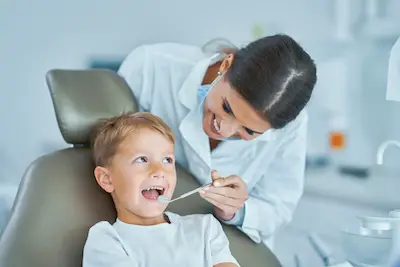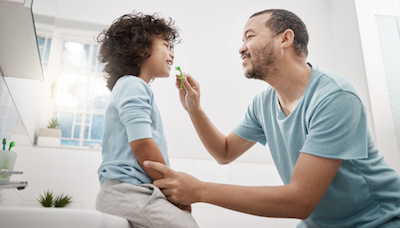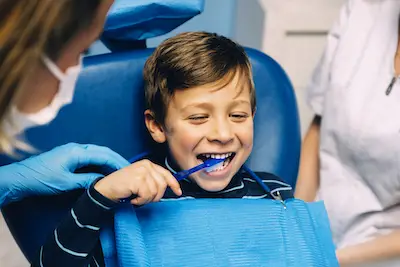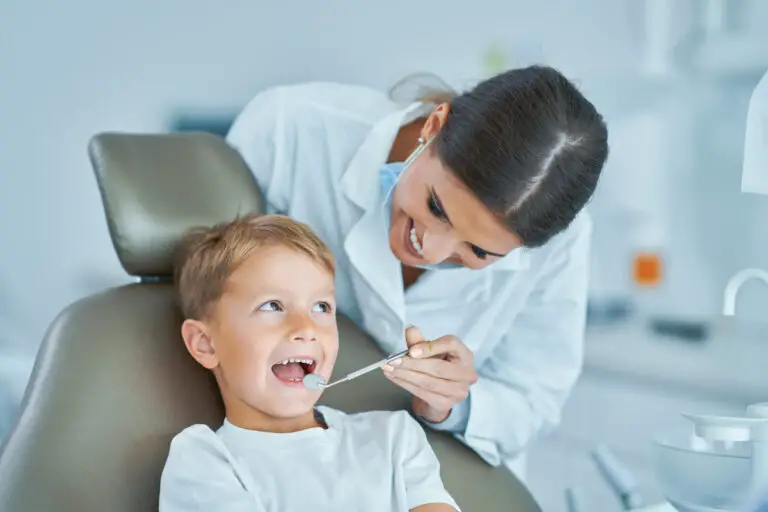It’s no secret that dental hygiene is important for people of all ages. But did you know that it’s especially important for children? That’s because their teeth are still developing and they’re more prone to cavities. That’s why you need to know all of the key things for your children’s dental hygiene, as well as the myths. So what are the common myths about children’s dental hygiene?
Here are the common myths about children’s dental hygiene, as well as what you need to know:
- Children don’t need to see the dentist until they’re school-aged
- Fluoride is bad for kids
- Baby teeth aren’t important
- Sugary snacks aren’t that bad for kids’ teeth
- Dental work is painful
In this article, we’ll cover reasons why dental health is so important for children, common myths around children’s dental hygiene, and some tips on how to help your child develop healthy dental hygiene from a young age.

The Importance of Children’s Dental Hygiene
Here are three reasons why dental hygiene is especially important for children:
1. Dental hygiene helps prevent cavities.
Cavities are caused by plaque, a sticky film of bacteria that forms on teeth. When plaque isn’t removed, it can harden and turn into tartar. Tartar can only be removed by a dentist or dental hygienist. If plaque and tartar are not removed, they will continue to damage the tooth enamel, which can lead to cavities.
2. Dental hygiene helps prevent gum disease.
Gum disease is an infection of the gums that can eventually lead to tooth loss. Gum disease is caused by plaque, just like cavities. But if plaque is not removed, it can cause the gums to become inflamed and bleed. This makes it easier for bacteria to get into the gum tissue and cause an infection.
3. Dental hygiene helps children avoid bad breath.
Bad breath, also known as halitosis, is usually caused by plaque and tartar buildup on teeth. When plaque and tartar are not removed, they release an unpleasant odor. Bad breath can be embarrassing for children and make them self-conscious.
Dental hygiene is important for children for all of these reasons. But it’s also important because it helps children develop healthy habits that will last a lifetime.
Common Myths About Children’s Dental Hygiene
There are many myths surrounding children’s dental health, and we will address five of them here.
1. Children don’t need to see the dentist until they’re school-aged
This is one of the biggest misconceptions about kids and dental care. In reality, it’s recommended that children see a dentist as soon as their first tooth erupts – usually around six months old. This early visit allows the dentist to check for any potential problems, such as cavities, and helps establish a good rapport between the child and the dentist. Ensuring that your child begins dental visits early in life is an excellent way to ensure that they have a strong foundation for good dental health as they grow.
2. Fluoride is bad for kids
Fluoride is actually essential for helping to prevent cavities, especially in young children whose teeth are still developing. It’s important to make sure that your child is getting enough fluoride through drinking water and using fluoride toothpaste (ask your dentist for recommendations).
Fluoride is a mineral that occurs naturally in many water sources, including rivers, lakes, and the ocean. It is also added to public water supplies in some communities. Fluoride helps prevent tooth decay by hardening the enamel on teeth and making them more resistant to the acids that cause cavities.
Fluoride is especially important for children because their teeth are still developing and they are more likely to develop cavities. The American Academy of Pediatrics recommends that all children receive fluoride treatments from their dentist starting at age 3.
There are many ways to get fluoride, including fluoridated water, toothpaste, and mouthwash. You can also talk to your dentist about professional fluoride treatments.
3. Baby teeth aren’t important
Baby teeth are very important for a number of reasons. They help your child learn how to speak and eat properly, and they also hold space in the jaw for adult teeth. So it’s important to take care of them – brush twice a day with a pea-sized amount of fluoride toothpaste and floss once a day.
4. Sugary snacks aren’t that bad for kids’ teeth
Sugary snacks are actually one of the worst things you can give your child in terms of dental health. There’s no denying that sugary snacks are delicious. But if you’re concerned about your child’s dental health, it’s important to be aware of the potential downside of these sweet treats.
Sugar is a major culprit when it comes to cavities. When bacteria in the mouth come into contact with sugar, they produce acids that can eat away at tooth enamel. This leads to cavities and other problems like tooth decay.
In addition to the risk of cavities, sugary snacks can also contribute to obesity. Kids who consume a lot of sugar are more likely to be overweight or obese, which can lead to a host of other health problems.
So what’s a parent to do? It’s important to limit your child’s intake of sugary snacks. Instead, opt for healthier alternatives like fruits and vegetables. And make sure your child brushes his or her teeth regularly to help prevent cavities.
5. Dental work is painful
This is one of the biggest misconceptions about dental care. In reality, modern dentistry is very gentle and pain-free. With proper care, your child’s teeth will be healthy and strong – and they won’t have to worry about pain at the dentist’s office. As pediatric dentists are specially trained to care for children’s teeth.

Pediatric Dentists
Pediatric dentists have been through extra training to learn how to care for children’s teeth. They know how to make kids feel comfortable in the dental chair and how to treat them with compassion. Plus, they’re experts in dealing with cavities, gum disease, and other dental problems that kids can face.
So if you’re looking for a dentist who can provide top-notch dental care for your child, look no further than a pediatric dentist. They’re the best of the best when it comes to caring for kids’ teeth!
If you’re looking for the best pediatric dentist, there are a few things you can keep in mind. First, it’s important to find someone who is experienced and qualified to work with children. You’ll also want to find a dentist who is gentle and patient, and who has a good bedside manner.
Here are a few tips on how to find the best pediatric dentist for your child:
1. Ask your child’s doctor for a recommendation
If you have a regular pediatrician that you trust, they may be able to recommend a good dentist for your child. You can also ask your friends or family if they have any recommendations.
2. Look for reviews online
When you’re searching for a pediatric dentist, it can be helpful to read reviews from other parents. This can give you an idea of what to expect and help you narrow down your options.
3. Ask about the dentist’s experience
When you’re talking to a potential pediatric dentist, be sure to ask about their experience working with children. You’ll want to make sure they’re comfortable working with kids and that they have the necessary training.
4. Schedule a consultation
Once you’ve narrowed down your options, it’s a good idea to schedule a consultation with the dentist. This will give you a chance to meet them in person and get a feel for their bedside manner. It’s also an opportunity to ask any questions you may have about their practice.
5. Trust your gut
Ultimately, you’ll want to choose a dentist that you feel comfortable with. If you have a good feeling about a particular dentist, they’re likely to be a good fit for your family.

Healthy Children’s Dental Habits
Finally, let’s talk about how to teach your child healthy dental habits. As a parent, you’re the most important influence in your child’s life when it comes to dental health.
1. Lead by example
Your children are more likely to follow your lead when it comes to dental hygiene if they see you practicing good habits yourself. So be sure to brush and floss regularly, and avoid sugary snacks when possible.
2. Make brushing fun
Brushing doesn’t have to be a chore. You can make it into a game by letting your kids brush their own teeth (with supervision, of course) or by using fun toothbrushes with their favorite characters on them.
3. Schedule regular dental checkups
Seeing the dentist on a regular basis is important for keeping teeth healthy. And, it can also be a fun experience for kids if you make it into a positive adventure.
4. Use positive reinforcement
When your kids brush their teeth regularly and take good care of their mouths, be sure to praise them for their efforts. This will help them see that taking care of their teeth is important and can be rewarding. If your child associates brushing and flossing thoroughly with a prize, a treat, or words of affirmation.
5. Help them understand the importance of good dental hygiene
As your children get older, take the time to explain to them why taking care of their teeth is important. This will help them develop good habits that will last a lifetime.
Conclusion
Parenting is a huge and important undertaking, and children’s dental hygiene is a big part of that. Understanding the importance of dental health is the first step, and modeling it for your children is ultimately the best thing you can do to build a solid foundation for their dental hygiene.


